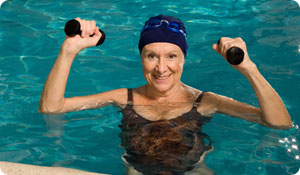
While senior citizens are not the ones who commonly come to mind when we picture people at the peak of fitness, there is a small but hardy subset of elderly people who defy the typical age-related physical declines experienced by most of their cohorts.
These vigorous folks take their health and athleticism seriously. In fact, some compete in sporting events and set records for their age groups. What sets apart these superfit seniors from the rest of us? And what can we learn from them?
Exercise doesn't just keep you cardiovascularly fit-it banishes all kinds of age-related illness. A couple of studies targeting middle-aged runners indicated that their very chromosomes were healthier than those of other people their age. Intense exercise seems to raise levels of an enzyme called telomerase. This enzyme maintains and repairs chromosomes, keeping you healthier and, in effect, turning back the clock.
Muscle is important. Walking may be great for your heart, but to be in optimal shape, it's important to build muscle. A 2007 study of both young and old people found that resistance training was key in terms of strength and health.
A group of older people whose average age was 70 underwent a six-month program of weight lifting and strength training. A younger group whose participants averaged 26 years of age followed a similar workout regimen. Before the workouts began, the older people were an average of 59 percent weaker than the younger people. But after the program, they were only 38 percent weaker.
In addition, tests showed that they were effectively able to reverse the normal age-related decline of their mitochondrial function. Mitochondria are cells' powerhouses; keeping the mitochondria working smoothly helps to keep the body free of disease.
Having support is crucial. Finding people to cheer you on in your fitness goals is important for anyone, but it may be particularly important for older people who are no longer driven by a desire to look slim or whose former workout buddies may all be dropping out of the race.
Experts have found that training partners and family members play an important role in keeping an aging athlete on his or her feet, but the biggest source of motivation typically comes from a spouse.
No matter whether you're 45 or 85, there's no excuse for not dusting off those sneakers and getting active. Your future longevity may depend on it.
Sources:
New York Times
www.nytimes.com
Buck Institute for Research on Aging
www.buckinstitute.org.





